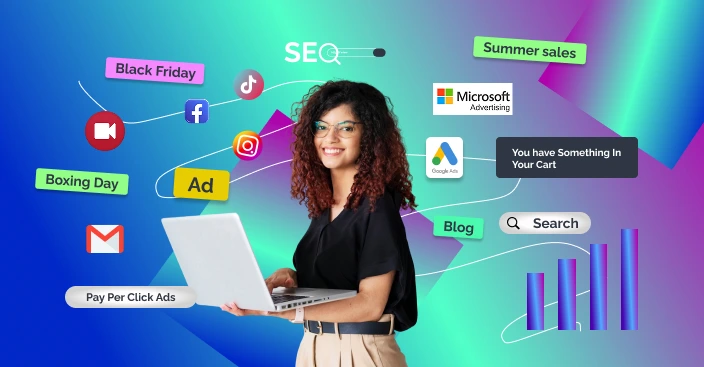A Complete Guide for eCommerce Digital Marketing Strategy for the UK Market

Table of Contents
UK online shopping is the most competitive and vibrant retail industry globally. The online commerce will grow to more than £150 billion in 2025, and it is crucial that retailers have an effective and functional online marketing plan if they are going to beat the competition.
Whether you are a new start-up firm or an established business, your online success is built on how much you engage with, communicate with, and keep the customer.
This blog is focus on a successful UK eCommerce digital marketing approach into actionable ingredients, tips, and best practices.
Why eCommerce Digital Marketing Matters in the UK
The UK has the second-largest e-penetration in the world. Over 82% of internet users purchase something online, and customers expect easy, fast, and seamless experiences.
Online marketing is now not a nice-to-have but the way to be viewed, drive traffic, and boost conversions. Without a strategic direction, businesses will be surpassed by those companies that are maximising SEO services in UK, paid search, and social media.
Major Components of a Successful eCommerce Digital Marketing Campaign
A successful digital campaign is not a collection of independent campaigns but one well-integrated master campaign. The most important components are:
Clear Business Objectives
All marketing initiatives have to begin with properly set objectives, for revenue growth, conversion rate enhancement, or average order value enhancement. The key objectives can be marketing initiatives focused on measurable outcomes.
Let’s take the example of a British fashion store, for instance, would have only one objective: to achieve 20% repeat purchases within six months via rewards of loyalty.
Understanding the audience
Know your British consumer. Familiarise yourself with the shopper profile, demographics, and retailing habits.
Gen Z consumers, for example, use instagram significantly more than any other social media, while millennials preferred facebook, linkedin heavily. Utilising content and campaigns here makes it more interactive and convertible.
Multi-Channel Presence
Single-channel dependence is risky. A good approach incorporates SEO, PPC, email, and social. This multi-channel approach gets your brand seen by customers multiple times during the customer path from Google discovery to Facebook retargeted advertising.
Mobile Optimisation
Over 64% of UK mobile business traffic comes from smartphones. Responsive design, quick loads, and frictionless checkout are no longer luxuries, they’re a conversion necessity. Mobile optimisation and modern Mobile Commerce Solutions let you intercept and convert mobile shoppers on the move.
Conversion Rate Optimisation (CRO)
Half the solution is bringing traffic in; turning browsers into buyers is cash. Methods like product page A/B testing, checkout improvement, and offering trust signals like reviews are employed.
Achieving a 1% conversion rate is the difference between a mountain of cash and pennies to UK online businesses’ bottom lines.
How UK eCommerce Businesses Can Attract More Qualified Traffic Online
It is easy to drive traffic but easy not to drive qualified and buy-ready traffic. UK businesses must be founded on the following strategies:
Search Engine Optimisation (SEO)
Natural search is the bedrock of visibility of eCommerce. Product page optimisation, UK-specific content development, and long-tail targeting keywords such as “best running shoes UK” will cause repeated qualified traffic.
Paid Advertising
Google Ads and Meta Ads are effective for targeting purchasing-intention customers. Shopping campaigns, UK stores, could be the source of price war and contain promotions and show up at purchasing intent.
Social Media Campaigns
Social media drives traffic via consideration browsing as well as direct sales. Instagram Shopping, TikTok video, and Pinterest board can generate discovery and sale, especially for fashion, lifestyle, as well as, home goods companies.
Email Marketing
Well-run email campaigns create repeat traffic and repeat business. With the help of segmentation the UK brands can get much better outcome. These efforts will help to convert inactive users, ensure target promotions, or push new product categories flawlessly.
Affiliate & Influencer Marketing
Acquire potentially cheap and effective outreach through these types of marketing. An admired blogger or Instagram influencer writing about your product can bring niche traffic that will convert.
The Role of SEO in an Effective eCommerce Strategy
SEO overall is the distinction between which companies are and are not. SEO gives UK eCommerce sites long-term existence.
1. Technical SEO
It being crawlable, fast, and secure (HTTPS) is a good start. Technical SEO avoids website errors and has your shop indexed on Google UK search results without punishment.
2. On-Page Optimisation
Keywording product names, descriptions, and meta tags with UK-specific keywords is more prominent. For instance, use “trainers” and “sneakers” instead of using just “trainers” which get a better ranking on dominating more general searches.
3. SEO for Content
Guide pages, blog posts, and review pages can receive top-of-funnel traffic. A UK garden center might produce “Best Plants for Small UK Gardens” to achieve search intent and drive the customer on to a sale.
4. Local SEO
For hybrid retailers, local SEO optimisation drives local customers to your doorstep. Google Business Profile listings and local terms such as “London furniture store online” drive local traffic.
Placing Content Marketing into Practice for eCommerce Sales
Content is the core factor for any brand, therefore it’s necessary to implement the right content marketing practice for ensuring better eCommerce sale.
Product Guides & Tutorials
Developing extensive product guides assists customers in making wise purchasing decisions. A UK electronics store can develop “How to Pick the Ideal Laptop for Remote Work.
Video Marketing
Vids boost engagement and trust. TikTok videos of YouTube reviews and unboxing push sales aggressively, especially in the beauty and tech verticals.

User-Generated Content (UGC)
User-geneerated content are something that can help to connect with end-users in a better manner. Few options can be asking for customer reviews, photos about their experiences. British customers like customer-created content like these more than brand marketing, making UGC an effective conversion tool.
Seasonal Campaigns
Publish content on UK-local holiday shopping events such as Black Friday, Boxing Day, or Christmas. Holiday campaigns trigger the feeling of shortage and create humongous traffic.
Best Digital Ad Channels to Use for UK eCommerce Businesses
Your perfect ad channel depends on your niche and audience. Utilise it wisely for ensuring effective outcome.
Google Shopping Ads
Well-suited for advertisers with high-intent buyers to target. Google Shopping showcases your products in the spotlight on product-specific search results pages with images, prices, and reviews.
Meta Ads
Ideal for awareness and retargeting. Powerful targeting enables UK brands to target individuals based on interest, demographic, and behaviour.
Instagram Ads
Instagram has also stepped up in the UK market, especially among Gen Z. Short, interactive video content generates strong impulse and interaction buys.
Email Retargeting Ads
Use of email lists in conjunction with ad networks allows brands to display targeted ads to non-converting subscribers.
Display & Programmatic Ads
For high-spending UK brands, programmatic advertising displays ads on thousands of websites in an attempt at maximum reach.
How Social Media Can Increase Your eCommerce Business
Social media has become the backbone for any business success, specifically for eCommerce, hence utilising this platform is the key necessity for growing your brands success. Let explore few key features below:
Social Commerce Features
Facebook and Instagram meticulously give a seamless purchasing experience as shoppers are able to buy from within the store itself.
Influencer Collaborations
UK influencer can connect with the brands to build trust and boost their reach. With the help of micro-influencers the businesses can deliver better ROI based on their each niche.
Paid Advertising
Target marketing is facilitated by paid media on media like Instagram and TikTok, and your ads reach the target audience.
Customer Interaction
Customer response comments, sharing experiences being shared, and holding Q&A sessions live create trust and belongingness towards your brand.
Analytics & Insights
Customer want insights provided through social channels to facilitate campaign optimisation to generate higher ROI.

Budgeting to Execute an Effective eCommerce Digital Marketing Strategy
You must have the appropriate budget to fuel expansion for your brands, few of them are mentioned below:
Overall Rule of Thumb
Generally, UK businesses invest 10–15% of revenues in digital marketing. Start-ups have to invest more heavily earlier to get momentum, often with the aid of a trusted digital marketing agency UK companies rely on.
Channel Distribution
Distribution of budget between SEO (long-term expansion), PPC (short-term profitability), content marketing, and social advertising. Portfolio balance for scalability & sustainability.
Testing & Scaling
Begin small test budgets to determine what is effective. After finding a successful channel, invest incrementally within that channel for the best ROI.
Industry Benchmarks
Fashion retailers would invest more in social media, and electronics would invest more in Google Shopping. Budgets are compared against UK benchmarks to trim the budget leaner.
Ongoing Optimisation
Budgets never stand still—check performance on a monthly cycle and re-budget towards the highest-performing campaigns.
Case Study
ASOS
ASOS is a UK high-street fashion internet market leader that relies solely on clever digital marketing. Through influencer collaborations, e-mails, and internet search engine marketing, ASOS invites shoppers globally but retains an active UK loyal fan base through social networking and mobile-first shopping.
Tesco
British grocery store chain Tesco leverages web momentum through online marketing. Through data-driven ads, extremely targeted Clubcard offers, and excellent in-app presence, Tesco builds customer loyalty. Channel-agnostic marketing focus leads to normalised shopping—customers shop either online, within an app, or offline—positioning Tesco as a UK retail market leader.
Conclusion
UK online retailing is expanding at a rapid pace, but under intense competition, only organisations with a very refined web campaign will survive.
Search engine optimisation plus paid search plus social media plus content marketing equals quality traffic for retailers who wish to grow sales and secure long-term loyalty.
Remember that online marketing is never ONE campaign-it is an ongoing test and tweak until it evolves.
With solid objectives at hand, knowledge of your audience, and plenty of budget, UK eCommerce businesses are able to develop into solid forces in the ever-changing web-gaming landscape.
Connect with a digital marketing expert for better understanding on the implementation and strategies based on your unique UK-based brands needs.
FAQs
 What are the key features for a growing your online campaign?
What are the key features for a growing your online campaign?
The five components that define success are clear-cut objectives, knowledge of the target market, SEO, multi-channel campaigns, conversion rate optimization services (CRO), and mobile optimisation.
 How do UK eCommerce businesses generate more qualified traffic offline?
How do UK eCommerce businesses generate more qualified traffic offline?
With the assistance of SEO, PPC Management Service, influencer outreach, and e-mail marketing, UK businesses generate converting traffic.
 Where does SEO fit in an eCommerce approach for success?
Where does SEO fit in an eCommerce approach for success?
SEO generates organic rankings, creates long-term traffic, and prepares your store for UK-nativity keywords that customers search for products.
 How can I leverage content marketing to generate eCommerce sales?
How can I leverage content marketing to generate eCommerce sales?
Content marketing can used for boosting customers trust, with the right content, end-users can get clear understanding of the product and services. It helps buyers to purchase seamlessly with depth tutorials, offers depending upon seasons, UGC, and product guides.
 How much budget should I invest to have a successful digital marketing eCommerce strategy?
How much budget should I invest to have a successful digital marketing eCommerce strategy?
Most UK web companies invest 10–15% of their earnings in adverts. Start-ups invest more money at the start in a bid to build market power.



